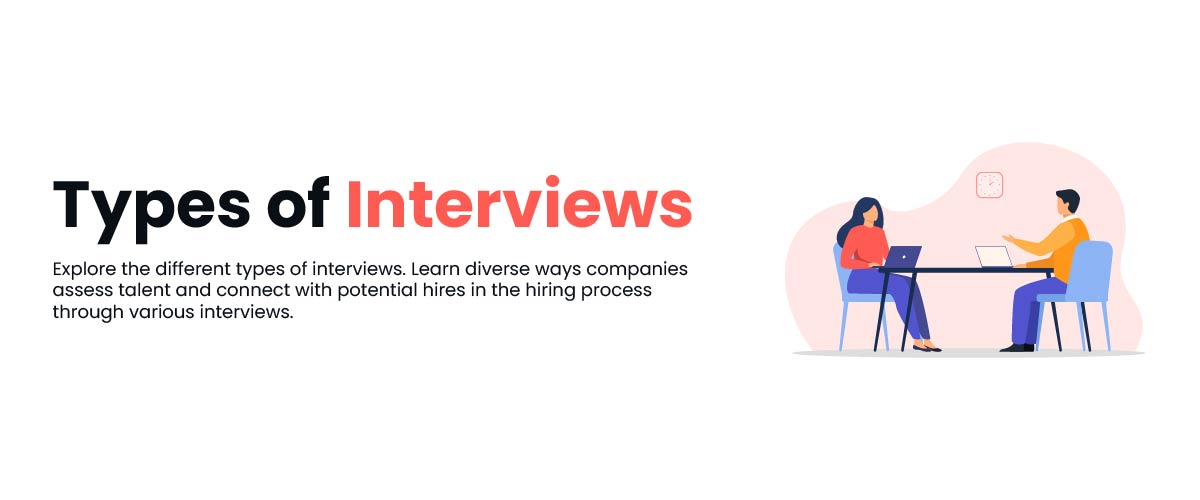What are the Types of Interviews?: Interviews in the Hiring Process & in Jobs

Have you ever thought about what kind of interviews await you on your upcoming job hunt? From traditional face-to-face meetings to high-stakes appraisal ones, the world of interviews is diverse. In this blog, we’ll see what are the types of interviews you might encounter while applying for a new job or as a hired employee. We will also help you prepare and excel in each unique setting with important tips.
Different Methods of Interviewing Candidates
There are three different methods used to interview candidates. Let’s look at them in a bit more detail:
1. In-Person Interview
This interview involves a direct meeting between a candidate and the interviewer, in person, allowing them to interact. It helps the interviewer to discuss qualifications, experience, and the job role in depth. It is a good medium for employers to assess nonverbal cues while interviewing candidates.
2. Telephonic Interview
A telephonic interview lets employers connect with candidates through phone calls instead of in-person meetings. This allows interviewing multiple applicants via calls who are in different geographical locations.
3. Video Interview
Video interview is held remotely via video calls. It is a good alternative to in-person interviews as it is less expensive and time-consuming. It also widens the pool of candidates applying for the position as one can easily communicate online.
If you’re preparing for a video interview, make sure to check out this blog on video interview questions and answers for valuable tips.


Types of Interviews in the Hiring Process
There are various types of interviews, each serving a different purpose. Let’s see what are the different types of interviews one by one:
4. Screening Interview
This is an initial interview conducted by employers to shortlist candidates. Its main aim is to evaluate candidates on basic qualifications, skills, and personality fit for the role.
It is shorter than other interviews, as it helps employers determine which candidates will qualify for the next stage of the hiring process.
5. Personal Interview
This interview involves a direct face-to-face conversation between the interviewer and the candidate, where the interviewer asks questions to gather information, check qualifications, or understand the candidate’s thoughts and opinions. It enables one to learn more about a person’s skills, experiences, or suitability for a job.
6. Panel Interview
It’s an interview where multiple interviewers ask questions to a candidate. Each panel member represents different areas of the company. The company uses this strategy to gather different perspectives from the panel members to assess the candidate’s suitability for the role.
7. Behavior Interview
Recruiters use this interview to assess if the candidate is a good fit for the team and the company. These interviews rely on real-life scenarios to understand how well a candidate understands and manages their own emotions, as well as their ability to empathize and relate to others.
It helps employers gauge a person’s interpersonal skills, self-awareness, and how they handle different situations in the workplace.
For a detailed list of these questions, you can visit this blog on the top 12 behavior interview questions
8. Technical Interview
In this interview, the candidate demonstrates their skills, knowledge, and problem-solving abilities relevant to a specific field or role. It typically involves practical tasks or questions to check a candidate’s application of subject matter knowledge.
Depending upon the organization this interview can be online as well as in person. The main purpose of the interview is to ascertain whether the candidate has the necessary skills and abilities to handle the job responsibilities.
9. Group Interview
It is an interview process where multiple candidates are assessed together by employers. They interact, discuss, and respond to questions, allowing employers to evaluate their teamwork, communication, and problem-solving skills, helping them choose the most suitable candidate for the position.
10. Stress Interview
It’s a job interview technique where the interviewer intentionally creates a challenging or pressure-filled environment to observe how a candidate handles stress, pressure, and unexpected situations. It aims to assess a candidate’s ability to stay composed and think clearly under difficult circumstances.
Various Types of Interviews for Hired Employees
During your employment journey, you will face various types of interviews. Each interview serves a different purpose within the workplace. Let’s look at them one by one:
11. Appraisal Interview
It allows an employee to discuss their performance and achievements with their manager and potentially negotiate a raise or salary increment on the basis of their contributions and value to the company.
If you want to enhance your interview skills consider enrolling in this comprehensive interview preparation course that covers a wide range of topics, from effective communication to handling challenging scenarios.
12. Internal Interview
This interview is held when the management considers current employees for a different role within the organization. It allows existing staff to apply and be assessed for new positions, offering them opportunities for career growth without leaving the company.
13. Exit Interview
This interview involves a conversation between an employee and an employer when an employee is leaving the job. It helps gather feedback about the job experience and reasons for leaving, which can be used to improve workplace conditions and retention strategies.
Conclusion
In this blog, we have understood what are the types of interviews, each with its unique approach. Remember, it’s not about trying to be someone you’re not, but about showcasing the best version of yourself. Take some time to understand the specific type of interview you might face and practice your responses.
If you want to put your best foot forward in Interviews. Then, check out this blog on how to prepare for an interview. Have you ever experienced an unusual interview format? How did you handle it? Share your thoughts and experiences in the comments below.
Also Read: Types of Mock Interview







